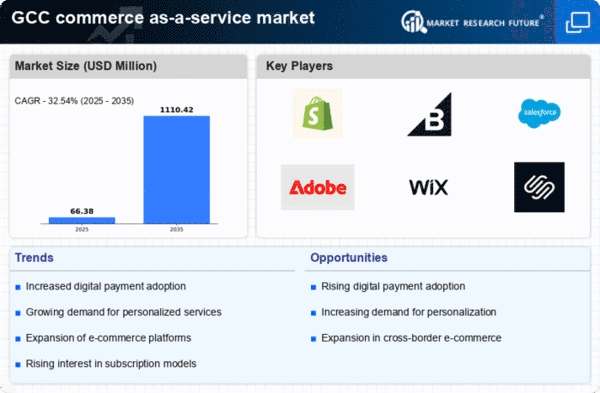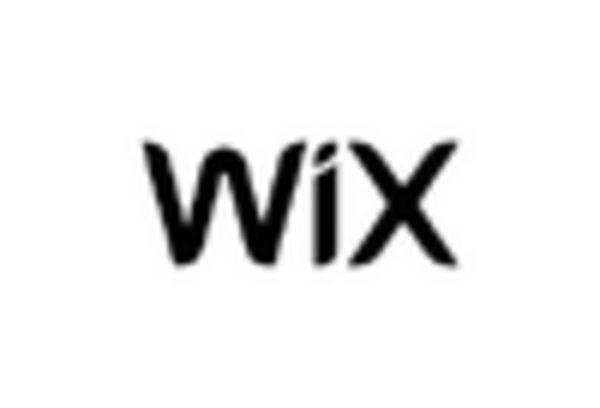Rising E-commerce Demand
The commerce as-a-service market is experiencing a notable surge in demand for e-commerce solutions across the GCC region. This trend is driven by a growing consumer preference for online shopping, which has been amplified by the increasing penetration of smartphones and internet connectivity. In 2025, e-commerce sales in the GCC are projected to reach approximately $30 billion, reflecting a compound annual growth rate (CAGR) of around 20% over the past few years. This rising demand necessitates robust commerce as-a-service platforms that can provide seamless integration, scalability, and flexibility for businesses looking to establish or enhance their online presence. As a result, companies are increasingly investing in these services to meet consumer expectations and remain competitive in a rapidly evolving digital landscape.
Technological Advancements
Technological advancements play a crucial role in shaping the commerce as-a-service market. Innovations such as artificial intelligence (AI), machine learning, and big data analytics are transforming how businesses operate and engage with customers. In the GCC, the integration of these technologies into commerce as-a-service solutions enables companies to offer personalized experiences, optimize supply chains, and enhance decision-making processes. For instance, AI-driven chatbots are becoming commonplace in customer service, improving response times and customer satisfaction. Furthermore, the market is witnessing an increase in the adoption of advanced payment solutions, which are essential for facilitating secure and efficient transactions. As these technologies continue to evolve, they are likely to drive further growth and innovation within the commerce as-a-service market.
Increased Focus on Data Security
Data security has emerged as a paramount concern for businesses operating in the commerce as-a-service market. With the rise in cyber threats and data breaches, companies in the GCC are prioritizing the implementation of robust security measures to protect sensitive customer information. Regulatory frameworks are also evolving to address these concerns, compelling businesses to adopt stringent data protection practices. In 2025, it is anticipated that spending on cybersecurity solutions in the GCC will exceed $10 billion, reflecting a growing recognition of the importance of safeguarding digital assets. As a result, commerce as-a-service providers are enhancing their offerings to include advanced security features, such as encryption and multi-factor authentication, to ensure compliance and build consumer trust. This focus on data security is likely to drive further investment in the commerce as-a-service market.
Shift Towards Subscription Models
The shift towards subscription-based business models is significantly influencing the commerce as-a-service market. Many companies in the GCC are recognizing the potential of recurring revenue streams and are adopting subscription services to enhance customer loyalty and retention. This trend is particularly evident in sectors such as retail, entertainment, and software, where businesses are leveraging commerce as-a-service platforms to manage subscriptions effectively. By 2025, it is estimated that subscription e-commerce will account for over 30% of total online sales in the region. This shift not only provides businesses with predictable revenue but also allows for better inventory management and customer engagement strategies. Consequently, the commerce as-a-service market is evolving to support these subscription models, offering tailored solutions that cater to the unique needs of businesses.
Emergence of Omnichannel Strategies
The emergence of omnichannel strategies is reshaping the commerce as-a-service market landscape. Businesses in the GCC are increasingly recognizing the importance of providing a seamless shopping experience across multiple channels, including online, mobile, and physical stores. This shift is driven by changing consumer behaviors, as customers expect a cohesive experience regardless of the platform they choose. In 2025, it is projected that over 70% of consumers in the region will engage with brands through multiple channels before making a purchase. Consequently, commerce as-a-service solutions are evolving to support these omnichannel strategies, enabling businesses to integrate their operations and deliver a unified customer experience. This trend not only enhances customer satisfaction but also drives sales growth, making it a critical driver for the commerce as-a-service market.
















